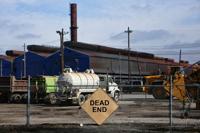Trump tariffs bring back 500 workers in Granite City
Citing President Donald Trump’s plans to impose tariffs on imported steel, United States Steel Corp. has said it will put roughly 500 workers back on the job by restarting one of two idled blast furnaces and associated steelmaking facilities at its Granite City factory.
“Immediately, I’ve seen some of the biggest smiles on their faces,” said Dan Simmons, President of United Steelworkers Local 1899 in Granite City. “It’s just so much relief for them and their families.”
The Pittsburgh-based steelmaker attributed the move to an expected rise in demand for domestic steel after Trump’s decision last week to impose tariffs of 25 percent on imported steel and 10 percent on aluminum. Workers should start being recalled later in March and the restart process could take up to four months, ending more than two years during which the plant’s raw steel-making blast furnaces sat cold.
“The president’s strong leadership is needed to begin to level the playing field so companies like ours can compete, win and create jobs that support our employees and the communities in which we operate as well as strengthen our national and economic security,” said U. S. Steel President and CEO David Burritt in a statement. “We will continue to support our customers with the high-quality products they have come to expect from U.S. Steel.”
U.S. Steel’s Granite City Works blast furnaces and steelmaking facilities were idled in December 2015, and the plant’s hot strip mill was idled in January 2016. More than 1,500 workers lost their jobs in a plant that employed 2,000 prior to the blast furnace shutdowns. The hot strip mill was restarted in February 2017, bringing back about 200 workers.
The plant never totally idled. Worker counts went as low as about 100 people. But for the last year, between 700 and 800 workers were employed at the plant, Granite City Economic Development Director James Amos said, mainly finishing raw steel made elsewhere.
Only in the depths of the Great Recession, from December 2008 to mid 2009, was the plant completely idled. The company had always maintained the Granite City blast furnaces that can produce about 2.8 million tons of steel annually would resume when steel prices rose.
Still, logistics companies, suppliers and those who bought steel from the plant all suffered during the last two years as the Metro East community of 29,000 residents waited for its largest employer to reopen, Amos said.
“There’s a symbiotic relationship of all our ancillary companies in the area, all built around our primary steel manufacturer,” Amos said. “When you take the hub out, it really affects things and it makes the relationships work not nearly as well.”
When the raw steel production furnaces were idled, U.S. Steel cited depressed oil prices in addition to low steel prices from a glut of imported steel. Granite City Works has been a major supplier of steel to make pipes and tubes for the oil industry at U.S. Steel’s Lone Star tube plant in Texas. That plant, too, was idled from April 2016 to April 2017.
But now, U.S. oil futures are at their highest price since mid-2015, according to CME Group. Oil prices had begun a precipitous drop in late 2014 and wouldn’t bottom out until early 2016, leading to steep losses and production cuts in what had been a booming domestic oil drilling market.
“With energy extraction at high levels, we could see the (oil country tubular goods) market demand continue with its steady recovery, which, of course, is good for the tubular segment as well as our North American flat-rolled business via the hot-rolled coil sales to customers,” Burritt told analysts on a Feb. 1 conference call.
The company also announced then that it had turned its first annual profit since 2014, with Morningstar writing in a report that day that U.S. Steel “rebounded in a big way in 2017.”
In 2016, the Commerce Department slapped duties on imported steel from China, Italy and other Asian nations after complaints over selling steel at below-market prices. That slowed the import flow from China, but other nations filled some of the gap and a glut of imported steel was still available within the U.S.
Between previous anti-dumping efforts, rising energy prices and a stronger U.S. Steel balance sheet, Simmons, the local Steelworkers union leader, had been expecting the plant to resume raw steel production soon.
“This is somewhat just icing on the cake,” he said of the Trump administration’s planned tariffs. “This was just enough to tip the scale.”
Many Republicans have broken with Trump over the steel tariffs, which they say could lead to retaliatory measures from other countries or raise prices for other manufacturers buying raw commodities.
But Rep. Mike Bost, the Republican Congressman who represents Granite City and other Metro East communities, has been a vocal proponent of the tariffs. The co-chair of the U.S. House steel caucus called the decision to reopen the plant “a big victory for the hardworking steel families in Granite City and the entire Metro East economy.”
Still, the United Steelworkers Union last weekend endorsed Brendan Kelly, Bost’s November opponent and the state’s attorney for St. Clair County. The union’s District 7 director, Mike Millsap, said that Bost “has been all talk, no action, and votes how he’s told.”














